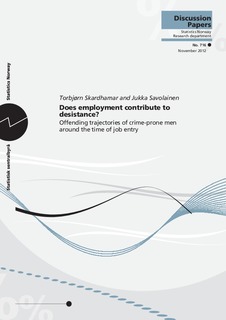| dc.contributor.author | Skarðhamar, Torbjørn | |
| dc.contributor.author | Savolainen, Jukka | |
| dc.coverage.spatial | Norway | nb_NO |
| dc.date.accessioned | 2019-11-13T08:20:13Z | |
| dc.date.available | 2019-11-13T08:20:13Z | |
| dc.date.issued | 2012-11 | |
| dc.identifier.issn | 0809-733X | |
| dc.identifier.uri | http://hdl.handle.net/11250/2628040 | |
| dc.description.abstract | Influential perspectives in life course criminology maintain that transitions to adult social roles play an important role in the termination of criminal careers. Along with marriage, employment is frequently associated with potential to assist in the desistance process. At this time, the empirical status of these claims remains contested. Although several studies report negative associations between within-individual changes in employment and offending, the evidence regarding time-order remains limited to anecdotal observations from qualitative data. The present investigation took advantage of administrative data sources available in Norway. Focusing on a sample of criminally active males who became employed during 2001-2006 (n=1,063), general and group based estimation techniques were used to examine monthly changes in offending trajectories around the point of job entry. Results show that most offenders had desisted prior to the employment transition, and that employment entailed marginal to no further reductions in criminal behavior. We were able to identify a group of offenders who became employed during an active phase of the criminal career; and these individuals did experience substantial reductions in criminal offending following job entry. However, this trajectory describes only about 2% of the sample. Overall, the pattern observed in this research suggests that employment, as a naturally occurring event, is best viewed as a consequence rather than a contributing cause of criminal desistance. | nb_NO |
| dc.description.sponsorship | Norwegian research council (grant number 202453) | nb_NO |
| dc.language.iso | eng | nb_NO |
| dc.publisher | Statistisk sentralbyrå | nb_NO |
| dc.relation.ispartofseries | Discussion papers;716 | |
| dc.subject | JEL classification: K10 | nb_NO |
| dc.subject | JEL classification: J10 | nb_NO |
| dc.title | Does employment contribute to desistance? Offending trajectories of crime-prone men around the time of job entry | nb_NO |
| dc.type | Working paper | nb_NO |
| dc.description.version | publishedVersion | nb_NO |
| dc.subject.nsi | VDP::Matematikk og Naturvitenskap: 400::Matematikk: 410::Statistikk: 412 | nb_NO |
| dc.source.pagenumber | 37 | nb_NO |
